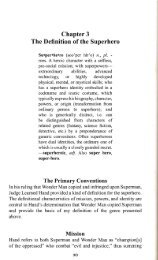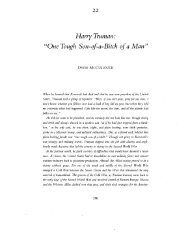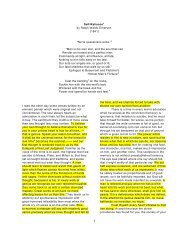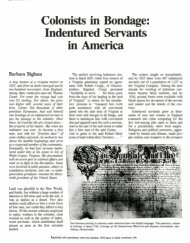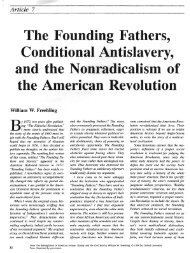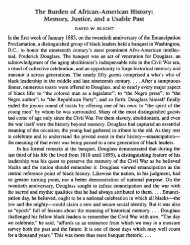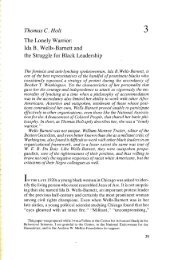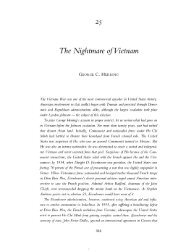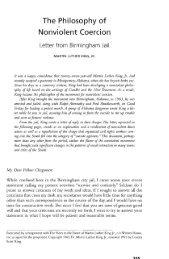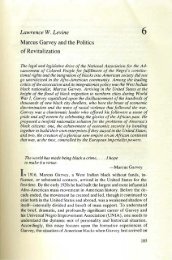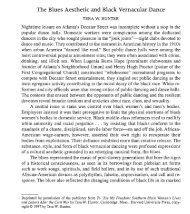Mary - Journeytohistory
Mary - Journeytohistory
Mary - Journeytohistory
You also want an ePaper? Increase the reach of your titles
YUMPU automatically turns print PDFs into web optimized ePapers that Google loves.
256 From Slavery to Freedombureau was vehement. There was serious objection to federal interference withthe relations between worker and employer. It was believed, moreover, that thebureau had a political program for enfranchising blacks and establishing astrong Republican party in the South.There can be no doubt that the Freedmen's Bureau relieved much sufferingamong blacks and whites. Between 1865 and 1869, for example, the bureau issued21 million rations, approximately 5 million going to whites and more than15 million to blacks. By 1867 there wen'; forty-six hospitals under the bureaustaffed by physicians, surgeons, and nurses. The medical department spentmore than $2 million to improve the health of ex-slaves and treated more than450,000 cases of illness. The death rate among former slaves was reduced, andsanitary conditions were improved.The bureau undertook to resettle many people who had been displacedduring the war. Because of the urgent need for labor to cultivate the land, freetransportation was furnished ex-slaves to leave congested areas and to becomeself-supporting. By 1870 more than 30,000 had been moved. Although abandonedand confiscated lands were generally restored to their owners under theamnesty proclamations of Lincoln and Johnson, the bureau distributed someland to former slaves. Colonies of infirm, destitute, and vagrant blacks were setup in several states. Small parcels of land were first allotted and then leased tothe colonies for management and cultivation.The bureau sought to protect blacks in their freedom to choose their ownemployer and to work at a fair wage. Both parties were required to live up totheir contract. Agents of the bureau consulted with planters and ex-slaves, urgingthe former to be fair in their dealings and instructing the latter in the necessityof working to proVide for their families and to achieve independenceand security. Thousands of blacks returned to work under conditions more satisfactorythan those that had existed before the bureau supervised their relationswith employers. Gen. Oliver Otis Howard, the bureau's commissioner,reported that "in a single state not less than fifty thousand [labor] contractswere drawn." Even when they did not lrnow all the stipulations of the contracts,many former slaves suspected that their employers would not live up tothem. The "fust difculty," a South Carolina freedman said, was that "we gits nomeat," although he assumed from the contract that they would.When it was felt that the interest of blacks could not be safely entrusted tolocal courts, the bureau organized "freedmen's" courts and boards of arbitration.These courts had civil and criminal jurisdiction over minor cases in whichone or both parties were ex-slaves. Frequently an expression of the bureau's interestwas sufficient to secure justice for former slaves in the regular courts. In<strong>Mary</strong>land, for example, the case of a white physician who assaulted a blackwithout provocation was taken by the bureau agent to the state supreme court,which admitted the testimony of blacks and convicted the physician.The bureau achieved its greatest successes in education. It set up or supervisedall kinds of schools: day, night, Sunday, and industrial schools as wellas colleges. It cooperated closely with philanthropic and religious organizations



